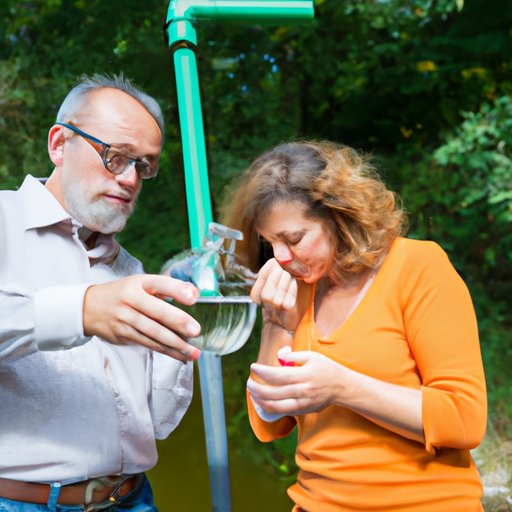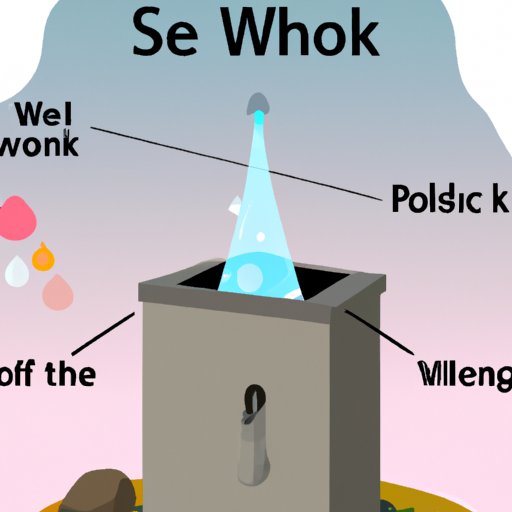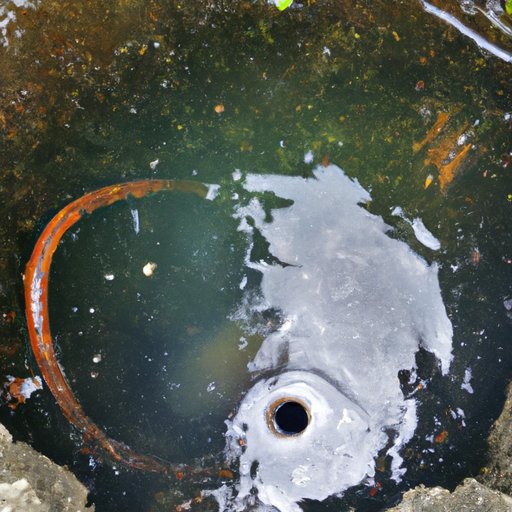Introduction
Well water is groundwater that has been extracted from underground aquifers using a well. It is a popular source of drinking water in many rural areas, as it is often cheaper and easier to access than piped municipal water. However, well water can sometimes have an unpleasant smell, which can make it difficult or even unpleasant to drink.
In this article, we will explore why well water may smell bad and examine some of the most common causes and solutions for unpleasant odors in well water. We will also look at the science behind well water smells and the importance of properly maintaining a well to ensure good water quality and odor.

Examining the Causes of Unpleasant Smells in Well Water
The first step in solving any problem is to identify the cause. When it comes to unpleasant odors in well water, there are several potential culprits. These include bacteria, algae, sulfur compounds, iron, and other contaminants.
Identifying and treating the source of the odor is the best way to eliminate it. Depending on the issue, this may involve shock chlorination, the installation of a water filter, or other treatments.
Common reasons why well water may smell bad include:
- Bacteria – Bacteria can cause a musty or rotten egg smell in well water. This is usually caused by anaerobic bacteria, which thrive in low-oxygen environments like deep wells.
- Algae – Algae can produce strong odors, such as a fishy, earthy, or sewage-like smell. Algae can enter a well through runoff from nearby bodies of water.
- Sulfur compounds – Sulfur compounds, such as hydrogen sulfide, can give well water a “rotten egg” smell. This is caused by naturally occurring bacteria breaking down organic matter in the water.
- Iron – Iron can give well water a metallic or earthy smell. Iron is a common contaminant in well water and can be caused by corroding pipes or other sources.

Investigating the Different Types of Contaminants that Cause Bad Smelling Well Water
There are a variety of different types of contaminants that can cause bad smelling well water. These include bacteria, algae, sulfur compounds, iron, and other contaminants.
Bacteria are microscopic organisms that are found naturally in the environment. They can cause a musty or rotten egg smell in well water. This is usually caused by anaerobic bacteria, which thrive in low-oxygen environments like deep wells.
Algae are small aquatic plants that can produce strong odors, such as a fishy, earthy, or sewage-like smell. Algae can enter a well through runoff from nearby bodies of water.
Sulfur compounds, such as hydrogen sulfide, can give well water a “rotten egg” smell. This is caused by naturally occurring bacteria breaking down organic matter in the water.
Iron can give well water a metallic or earthy smell. Iron is a common contaminant in well water and can be caused by corroding pipes or other sources.
Other contaminants, such as manganese and nitrates, can also cause unpleasant odors in well water.

Understanding the Science Behind Well Water Smells
To understand why well water may smell bad, it is important to understand the chemistry behind it. Well water is made up of a variety of minerals, such as calcium, magnesium, sodium, and potassium. These minerals interact with each other and with other substances in the water, such as bacteria and pollutants.
When these substances interact, they can create unpleasant odors. For example, when sulfur-containing bacteria break down organic matter, they can produce hydrogen sulfide gas, which gives off a “rotten egg” smell. Similarly, when iron interacts with oxygen, it can create a metallic smell.
The Impact of Poorly Maintained Wells on Water Quality and Smell
It is important to properly maintain a well in order to ensure good water quality and odor. Poorly maintained wells can lead to the buildup of bacteria, algae, and other contaminants, which can cause bad smells in the water.
Regular maintenance, such as shock chlorination, can help prevent these issues. Additionally, it is important to inspect the well regularly for signs of damage or corrosion, which can lead to contamination and bad odors.
Conclusion
Well water can have an unpleasant smell due to a variety of factors, including contamination, chemical interactions, and poor maintenance. By understanding the causes and exploring the science behind well water smells, we can take steps to eliminate unpleasant odors in our water.
The best way to solve any problem is to identify and address the source. If you suspect that your well water has an unpleasant odor, contact a professional to inspect the well and recommend the appropriate treatment.
Properly maintaining a well is essential to ensuring good water quality and odor. Regular maintenance, such as shock chlorination, can help prevent the buildup of bacteria, algae, and other contaminants that can cause bad smells in the water.
Summary
In this article, we explored why well water may smell bad and examined some of the most common causes and solutions for unpleasant odors in well water. We looked at the science behind well water smells and the importance of properly maintaining a well to ensure good water quality and odor.
By understanding the causes and exploring the science behind well water smells, we can take steps to eliminate unpleasant odors in our water. Proper maintenance and regular inspections are key to keeping well water clean and odor-free.
(Note: Is this article not meeting your expectations? Do you have knowledge or insights to share? Unlock new opportunities and expand your reach by joining our authors team. Click Registration to join us and share your expertise with our readers.)
